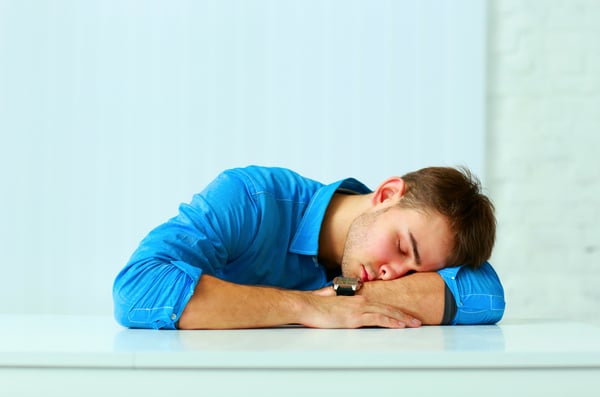How Can Managing Stress Improve Sleep Quality?
Published on: February 22, 2024 | Reading time: 🕐 3m

During sleep, while our body rests, it is time for our brain to recharge. Sleep is in fact so crucial to our daily activities that even a partial sleep deprivation (ex. one less hour of sleep per night) or poor sleep quality can affect our memory, judgment, and even our mood. In the relentless hustle of modern life, the quality of our sleep is often impacted by stress and our evermore-demanding schedules, particularly for those with a history of insomnia symptoms.
”Stress can affect sleep in different ways,” said Dr. Annise Wilson, assistant professor of neurology and of pulmonary, critical care and sleep medicine from the Baylor College of Medicine[1]
Stress triggers the release of hormones like cortisol, which can disrupt the natural sleep-wake cycle. Additionally, heightened stress levels often contribute to racing thoughts and increased mental activity, making it challenging for individuals to relax and fall asleep. If you recognize yourself in high reactivity to stressors and racing thoughts at night, understanding the intricate relationship between stress management and sleep may help unlock more restful nights.
How does stress impact sleep?
Stress is usually a normal reaction of the body in response to a danger. When our body is under stress, it activates the sympathetic nervous system, the part of our nervous system making us either fight or flight in stressful situations. This activation triggers the release of stress hormones, such as cortisol and adrenaline.
While this hormonal response is essential in dangerous situations, prolonged exposition associated with chronic stress can lead to a state of hyperarousal, making it difficult for the body to relax and unwind, especially when it's time for sleep. Daily stressors such as work-related problems, a fight with a spouse, or even social media over-exposition, may affect the time it takes to fall asleep and the quality of our sleep.
Elevated stress levels have also been shown to influence the sleep architecture, including the duration of each sleep stages. For instance, people experiencing chronic stress may experience a decrease amount of deep sleep [2].
Cortisol plays a crucial role in regulating the sleep-wake cycle. Elevated cortisol levels during the evening and at night can interfere with the body’s ability to wind down for sleep. This disruption can be observed often in depression and individuals under chronic stress.
Lastly, lack of sleep can also trigger our body’s stress response, creating a reciprocal relationship between inadequate sleep and heightened levels of cortisol, forming a challenging loop that requires specific interventions both aiming at stress management and sleep optimization.
What are the most common signs of stress-related sleep issues?
Identifying the signs of stress-related sleep difficulties is the first step towards effective treatment. These may include persistent insomnia, frequent awakenings, restless sleep, as well as vivid dreams or nightmares. Additionally, lack of sleep can trigger emotional irritability and difficulty concentrating during the day which, in turn, may maintain the heightened levels of stress.
Insomnia
Insomnia is a sleep disorder characterized by difficulty falling asleep, staying asleep, or both, even if you have ample time and a bedroom environment conducive to restful sleep. Acute insomnia describes sleep difficulties lasting for a few days or weeks, but not longer than three months. Acute insomnia can often be traced to an external cause, such as a divorce, the arrival of a newborn, or the death of a loved one. If acute insomnia persists over multiple months, even when the trigger has passed, it is now classified as chronic insomnia.[3]
Managing acute or chronic insomnia without professional help can be rather difficult it is however reassuring to know that there is a viable solution that has been tested and clinically proven: Cognitive Behavioral Therapy for Insomnia (CBT-I). This evidence-based approach has shown effectiveness in treating both acute and chronic insomnia by targeting the underlying causes, promoting healthier sleep habits, and leveraging the physiological processes involved in normal sleep regulation.
Frequent awakenings and restless sleep
Normal sleep involves cycling through different stages, including periods of light, deep sleep, and dreaming. It’s typical for individuals to experience brief awakenings between sleep cycles without reaching full consciousness. These brief awakenings, often unnoticed, are a natural part of the sleep process. However, frequent awakenings that disrupt the continuity of sleep may indicate an underlying issue.
In normal circumstances, waking up a few times during the night is not uncommon, and individuals can seamlessly return to sleep. On the other hand, if someone consistently experiences frequent awakenings, struggles to fall back asleep, or feels unrested during the day, it may signal a deeper sleep disorder. Factors such as stress, lifestyle choices, or an untreated sleep disorder could contribute to these abnormal waking patterns, necessitating specific interventions to ensure the best recovery and a more restful sleep experience.
Vivid dreams
Experiencing vivid dreams is a common and often normal aspect of sleep, with dreams typically occurring during the rapid eye movement (REM) sleep stage. During REM sleep, the brain is highly active, and vivid dreams can unfold, often accompanied by emotional intensity and sensory impressions. It is considered normal for individuals to have several dreams each night, even if they don’t always remember them.
In cases when vivid dreams may be more noticeable or disruptive, it may potentially be indicative of other factors such as stress, medications, or sleep disorders. While occasional vivid dreams are generally not a cause for concern, persistent and distressing dream patterns may warrant further exploration to understand and address any underlying issues impacting the quality of sleep. Mental imagery rehearsal therapy can offer effective strategies for improving overall sleep quality and treating specific problems associated with intense dreams and nightmares.
What are some effective stress-reduction techniques for better sleep?
To reclaim restful nights, it is crucial to incorporate stress-reduction techniques throughout the day and integrate them into our bedtime routine. A common mistake is to attempt to unwind only an hour before bedtime. Effective stress management is a continuous effort, extending beyond bedtime rituals, and must become an integral part of daily life. Moreover, tailoring stress-relief methods to individual preferences is key in treatment adherence and effectiveness, whether it is through walks in nature, taking brief breaks, meditating and other breathing exercises, or using guided relaxation apps.
Finally, the key in stress-reduction is consistency. Optimal results are achieved with regular practice, forming an integral part of one's lifestyle rather than sporadic remedies. No matter how little time you may dedicate to your favorite stress release technique (even if it is only 5-10 minutes), it can have a profound impact on nighttime sleep.
Sleep routine
Establishing a consistent sleep routine is paramount for people with chronic insomnia. A relaxing moment and stress management techniques can be great addition to your bedtime routine. They are also often part of Cognitive Behavioural Therapy for Insomnia (CBT-I). This therapeutic approach addresses the thoughts, behaviours, and emotions contributing to sleep difficulties. Learn more about how CBT-I work in our article: “CBT-I: The Best Treatment for Chronic Insomnia”
Sleep hygiene
Here are some valuable tips for cultivating a healthier sleep hygiene:
- Avoid screens at least one hour before bedtime
- Refrain from coffee after noon
- Steer clear of alcohol, heavy meals, and spicy foods close to bedtime
- Stay hydrated during the day but stop drinking water at least two hours before bedtime
- Ensure your bedroom is a stress-free, restful space by reserving it for sexual activities and sleeping only Avoid reading, using your phone, watching TV, or engaging in other stimulating activities
Remember that the journey to improved sleep quality starts with acknowledging the impact of stress. By integrating stress management techniques into your daily routine, you pave the way for restorative nights and enhanced overall well-being.
[1] Kaylee Dusang, ‘’ How stress can affect your sleep ‘’, Baylor College of Medicine, (May 9th 2019), https://www.bcm.edu/news/how-stress-can-affect-your-sleep
[2] Eric Suni, Alex dimitriu, ‘’ Stress and Insomnia ‘’, Sleep Foundation trusted source from Division of Sleep Medicine at Harvard Medical School. (November 16th 2023) Natural Patterns of Sleep. https://www.sleepfoundation.org/insomnia/stress-and-insomnia#references-78224
[3] Eric Suni, Dr. Anis Rehman, ‘’Insomnia- What it is, how it affects you and how to help you get back your restful nights,‘’, Sleep Foundation, ( updated January 16th 2024 ), https://www.sleepfoundation.org/insomnia
Need help with your sleep?
We can help you! HALEO offers a solution that can contribute to productivity and well-being through quality sleep. Schedule a discovery meeting by booking your time here.




